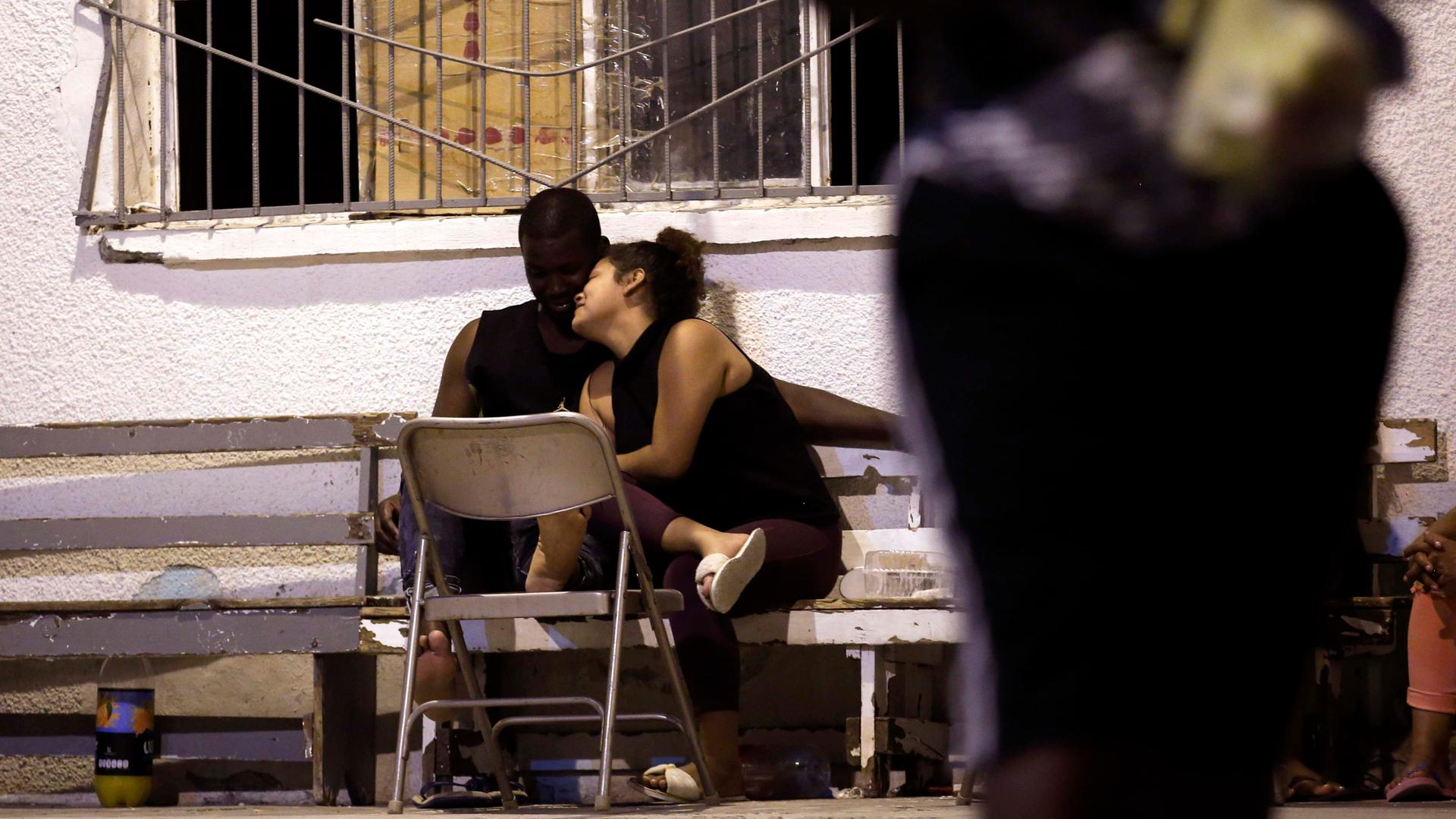It was an election night gathering like no other. A handful of round plastic tables and chairs were set up Tuesday evening in the dining hall at El Buen Pastor, a migrant shelter located off a narrow unpaved street in Ciudad Juárez, just across the Rio Grande River from El Paso, Texas.
A television mounted on the wall was playing Telemundo, with about a dozen people tuned in — including some couples with small children and a few men sitting alone.
For them, the stakes of this US election could not be higher.
For all its emphasis on building a border wall between the US and Mexico, the Trump administration’s primary means of keeping out asylum-seekers and migrants has been through erecting ever-higher administrative barriers to entry. New border restrictions during the COVID-19 pandemic have slowed asylum-seeker entries at the southern border drastically since March.
Pedro Luís Tamayo, an asylum seeker from Cuba, watched and then folded his arms as he leaned back on his chair. He knew the US electoral system well, understanding that the popular vote does not decide the election and cognizant of which state has the most electoral votes.
“Fifty-five electoral votes, California,” he said over the phone.
Related: In Ciudad Juárez, a new hotel offers migrants a safe place to quarantine
Tamayo said he was a dissident and an independent journalist, which put him on the wrong side of the Cuban government. It was hard to find work, he said, so he sold slices of cake on the street to get by. Worried he would eventually wind up in prison for his political views, he left for Brazil, where he worked and gathered up enough cash to migrate to the southern US border.
Tamayo said he eventually wants to live in Florida, so he tracked the vote there. He said he supports President Donald Trump’s hard-line policies against Cuba, but ultimately prefers Democratic candidate Joe Biden because of his more welcoming immigration plan.
“If Biden wins, the prospects are good. He promised to end MPP,” Tamayo said, referring to the Migrant Protection Protocols program, also known as “Remain in Mexico.” The program forces asylum-seekers like Tamayo — and tens of thousands of others — to wait in Mexico for their US court dates. Biden has pledged to terminate MPP on day one of his presidency.
In Tamayo’s case, his court dates have been postponed several times. His next hearing is in May 2021. The slow timeline is not unusual, following MPP implementation in January 2019 as part of the Trump administration’s hardline immigration policies. The program has left Tamayo in indefinite limbo. He has been at the shelter for more than a year. Meanwhile, the pandemic has prolonged the waits, as US officials have shut down immigration courts completely.
Immigration lawyer Taylor Levy is among those trying to help asylum-seekers stuck on the Mexican side of the border. She lives in El Paso but regularly heads to the handful of shelters in Juárez.
On Nov. 3, the day of the US election, she crossed over to offer asylum-seekers legal guidance and pick up pizzas from Little Caesar’s.
“We’re going to watch the returns coming in,” she said. “Instead of being home kind of doomscrolling, I decided the absolute best way I could spend my time would be to come over here and just give legal advice to people and kind of explain the possibilities for the outcome for the elections.”
Levy is hoping Biden wins the election — and returns to pre-Trump policies that allow asylum seekers to wait out their cases in the US, often with relatives who are waiting to receive them in America. In Mexico, they are often stuck in a range of precarious housing, from small apartments in high-crime neighborhoods to squalid camps and crowded shelters. They also face numerous risks — from robberies and sexual assault to kidnapping, often orchestrated by organized criminal groups that extort migrants’ relatives in the US for cash.
Levy has met migrant parents in Juárez who fear the conditions they are in and must make desperate choices.
“A lot of the parents who I’ve spoken to in the shelters have been separated from their children because they have sent their children ahead alone. They feel like it’s the only way to keep them safe.”
“A lot of the parents who I’ve spoken to in the shelters have been separated from their children because they have sent their children ahead alone,” she said. “They feel like it’s the only way to keep them safe.”
Levy also hopes that a Biden administration would learn from the mistakes she said President Barack Obama made on immigration. Some immigrant advocates call Obama the “deporter in chief” for expelling immigrants at rates that even Trump has yet to surpass.
“We hope that not only has Biden and his administration — if they come into power — learned from their past mistakes but also that public sentiment has shifted. And we know how horrific and traumatizing some of these policies can be to people,” Levy said.
Juan Fierro García, who runs the Juárez shelter, also hoped that Biden becomes president and implements a more humane immigration policy.
He also expects a migratory shift that could be one of the first tests of a Biden presidency: “People will find a way to come to the border and seek asylum. There will be hope.”
